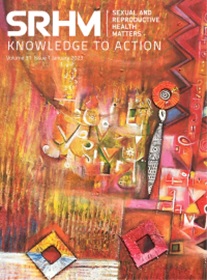Extending the concept of "obstetric violence" to post-partum experiences: cautions regarding the "first ever" pill for post-partum depression.
IF 3.3
2区 医学
Q1 PUBLIC, ENVIRONMENTAL & OCCUPATIONAL HEALTH
Sexual and Reproductive Health Matters
Pub Date : 2024-12-01
Epub Date: 2025-01-13
DOI:10.1080/26410397.2024.2441031
引用次数: 0
将“产科暴力”概念扩大到产后经历:关于产后抑郁症“首次”避孕药的注意事项。
首先在拉丁美洲,随后在世界各地以及在超国家人权论坛的判例中,越来越多地发现“产科暴力”,这已成为争论生物医学范式中编码的权力不对称和审查生殖治理的关键场所。与“不尊重和虐待”的说法,或在美国更常见的“产科虐待”的说法相反,实施“产科暴力”的一个关键方面是,质疑将怀孕和分娩作为一种医疗状况或事件,而不是一种自然过程进行治疗。到目前为止,除了因不支付费用而在保健设施拘留等恶劣行为外,很少注意产后产科暴力。我们在这里主张扩大对产后时期的考虑,包括药物化,重点是美国的情况。快速增加的PPD诊断,特别是在有色人种女性中,以及新出现的药物解决方案,可能会成为缺乏获取的解决方案。然而,生物医学框架转移了人们对情绪困扰的社会政治原因的关注,这对女性个人和公共健康产生了重大影响。以最近批准的治疗产后抑郁症的“第一种”药丸——祖拉诺酮(品牌名Zurzuvae)为例,我们认为,将生殖主体的经历减少到生化失调,以及降低制药行业的监管标准,有可能使一种微妙但具有破坏性的产科暴力形式永世存在,这值得关注。
本文章由计算机程序翻译,如有差异,请以英文原文为准。
求助全文
约1分钟内获得全文
求助全文
来源期刊

Sexual and Reproductive Health Matters
Medicine-Obstetrics and Gynecology
CiteScore
4.00
自引率
8.30%
发文量
63
审稿时长
16 weeks
期刊介绍:
SRHM is a multidisciplinary journal, welcoming submissions from a wide range of disciplines, including the social sciences and humanities, behavioural science, public health, human rights and law. The journal welcomes a range of methodological approaches, including qualitative and quantitative analyses such as policy analysis; mixed methods approaches to public health and health systems research; economic, political and historical analysis; and epidemiological work with a focus on SRHR. Key topics addressed in SRHM include (but are not limited to) abortion, family planning, contraception, female genital mutilation, HIV and other STIs, human papillomavirus (HPV), maternal health, SRHR in humanitarian settings, gender-based and other forms of interpersonal violence, young people, gender, sexuality, sexual rights and sexual pleasure.
 求助内容:
求助内容: 应助结果提醒方式:
应助结果提醒方式:


